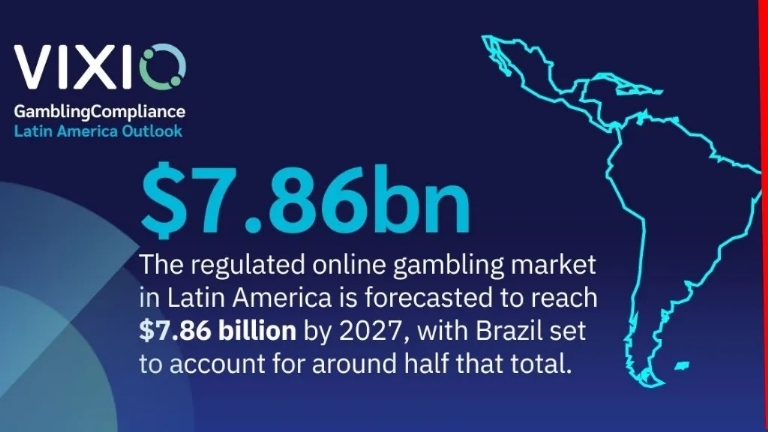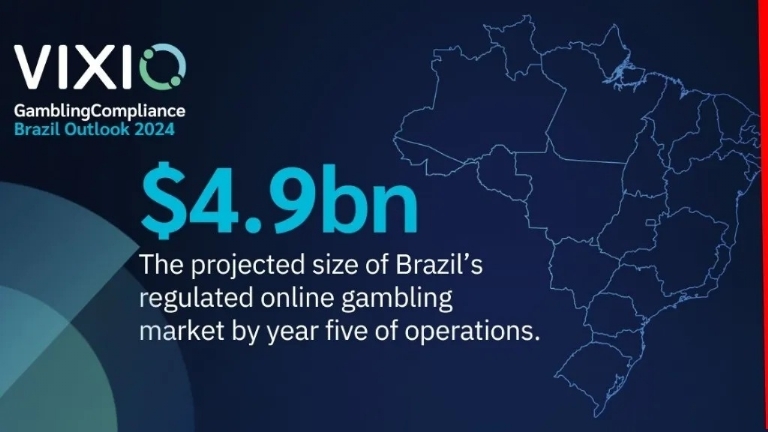

Latin America’s regulatory transformation
For years, people viewed Latin America as an emerging market. However, as James explains, the region’s regulatory map is now more complete than ever. Over the past few years, especially from 2021 to 2025, there has been rapid progress in the legalisation of online gambling. Countries like Brazil and Peru have not only regulated but have active licensing regimes that make the market more accessible for operators.
He is keen to reiterate that recent Vixio research on the Latin America outlook shows that the map from South America up to Panama, El Salvador, Nicaragua and Mexico shows there aren’t many outliers now where online gambling is under-regulated or unregulated. Ecuador adopted a licencing system for sports betting, but not for online casinos, which will remain a monopoly of the national lottery. He also points to Chile as an outlier, although it has progressed slowly in regulating online gambling. We should therefore consider Latin America a regulated region.
A Brazil’s bonanza is a game changer
In Brazil, online betting regulation is a breakthrough.
“It isn’t a secret or surprise why the industry keenly watches Brazil,” James asserts. “At Vixio, we published our latest Latin American outlook in November and have a guide to the Brazilian online gambling market on our website."
“Our forecast for the market is that we expect gross revenue to reach $2.9 billion U.S. this year. In year one! That would make Brazil one of the top ten regulated markets globally right off the bat."
“And then, we anticipate the market will grow to more than $6 billion U.S. by 2028. Obviously, that’s far in the future, but Brazil could be the number two market globally."
“So, what you’re talking about here is the emergence of one of the largest regulated global markets. These new market opportunities don’t come along often.”
This is significant because Brazil was previously an outlier in a region with established frameworks for traditional gaming, such as casinos and slots. The new licensing system for online betting marks a fundamental shift in Brazil’s approach to gambling, and it could pave the way for regulating land-based casino resorts and bingo halls in the future.
Despite this progress, James highlights that the true impact of Brazil’s gambling regulation will be more internal than external. As Brazil embarks on this new phase of legalisation, the focus will likely shift towards regulating land-based gaming, which could have far-reaching effects on the country’s gambling market.
Brazil’s unique regulatory challenges
Brazil differs from other markets in terms of regulatory perspectives. There is a unique range of requirements that challenge operators and providers. One would be facial recognition as an authentication or know your customer (KYC) requirement. This presents its own problems in terms of privacy concerns and technical challenges. James adds that while 2024 was a hectic year, signing a new law, adopting regulations, opening the licence process, and awarding licences, there is still a policy overhang that is yet to be resolved in 2025.
“So, the industry is launching in Brazil with various uncertainties that must be resolved.” He gives the example of a new tax applied to online betting that goes over and above those already put in place, and operators are paying now. Yet, Brazil is fast-tracking rolling out its regulations compared to other jurisdictions. Our conversation clearly shows that much needs to be played out in Brazil before it becomes a fully settled, regulated market. One standout aspect of Brazil’s gambling market is its unique stance on poker, which operates under different rules compared to other forms of gambling. Vixio’s comprehensive ‘Brazil Online Gambling Playbook 2025‘ offers further insight into this exciting new market.

The poker paradox: Regulation v growth
While Brazil is making moves in online gambling, James notes an intriguing nuance regarding poker. Brazilian authorities don’t consider poker gambling; therefore, it isn’t subject to the same restrictions. Authorities class poker as a game of skill, not pure chance. This is deeply ingrained in the country’s legal and cultural perceptions.
This unique stance has allowed for a thriving poker market—both online and land-based—despite the absence of regulation. James sees this as a potential growth area as regulations evolve, providing opportunities for operators to capitalise on Brazil’s unregulated poker market. It is an interesting topic, given that the SiGMA Poker Tour visits Brazil for the first time in April 2025. While poker benefits from this unique regulatory situation, there remain different hurdles for operators entering Brazil, especially when it comes to adapting their technology.
Adapting to technical burdens is the key to market entry
The technical burden is one of the most misjudged challenges for operators entering new markets. James says, “I don’t think this is overlooked, but it’s potentially underestimated.” He admits that adapting platforms, games and technologies for differing local regulatory requirements is tricky and time-consuming.
“It is a process that often requires certification and adjustments to existing infrastructure, which can take longer than expected.” In recent years, markets like Peru and Brazil have seen delays, emphasising the importance of proper planning and preparation."
This technical challenge can be an afterthought for many operators, but it should be a priority. James points out that regulators and governments sometimes underestimate the effort involved. Fortunately, new tools like Vixio’s technical compliance tool aim to streamline the process, making it easier for suppliers and operators to meet the demands of diverse jurisdictions. Once these technical challenges are overcome, there is always a need for operators to stay ahead of any regulatory changes.
The regulatory moving target
James warns that regulatory environments are rarely static, even when a market opens. The laws and rules can often shift, and operators must be prepared for changes down the line. A thriving market entry today doesn’t guarantee success in the future. Operators must think beyond the current regulatory framework and predict how the rules might evolve in the next six, 12, or 24 months. As James puts it, “The goalposts can move,” and staying ahead of these changes is crucial for long-term success.
We have already seen this in regions like North America. The U.S. market has consolidated in ways few expected just five years ago. James says many operators rushed into the market thinking they could claim a share of the revenue pie, but the market is now dominated by a handful of large players.
This rapid consolidation is a vital lesson for operators in other regions, particularly Latin America, where market dynamics could play out similarly. Just as regulations change, so does the market itself, which makes understanding and anticipating market consolidation essential for operators who seek a foothold in new regions.
Market share and the power of consolidation
As operators look to expand into new territories, it is essential to consider market share. James urges operators not to just focus on the top-line potential revenue of a new market. Instead, it is important to realistically assess the market share they can capture.
The key takeaway is that operators must carefully analyse both the market potential and the competition. While the promise of significant revenues can be tempting, the reality often involves fierce competition and market saturation. As James advises, operators should research and assess the landscape before entering a new market.

High entry fees and the question of quality
James also touches on the debate around the cost of entering regulated markets. In some regions, such as Italy, there is a belief that higher entry fees lead to a higher quality of operators.
In a recent interview with SiGMA News, Quirino Mancini, a key figure in the Italian iGaming market, argues that the “cream” will always rise to the top. He says, higher entry fees will ensure that only the most serious and capable operators are allowed to enter, ultimately benefiting the market.
This perspective can be challenging for smaller operators who may struggle to afford the high fees required to enter regulated markets. The cost of entry can be a significant barrier, potentially limiting their ability to compete.
James acknowledges this challenge but suggests that, in the long term, higher entry fees could lead to a more regulated and professional industry, even if it means fewer players in the market.
Online gambling is no longer confined to the few emerging jurisdictions. Once viewed as a fragmented region needing regulatory overhaul, Latin America is now a beacon of potential for operators who can adapt to its unique challenges.
From Brazil’s transformative market to the developing regulations across the continent, the path is paved with gold but beware of the hurdles. As James Kilsby highlights, success is more than just compliance. It demands foresight, technical innovation, and strategic execution.
The rewards should justify the effort for operators willing to navigate this elaborate landscape. Latin America offers a new golden age of growth and invention in the global iGaming industry. Can operators balance these challenges to unlock the region’s full potential?
Source: SiGMA World (by David Gravel)